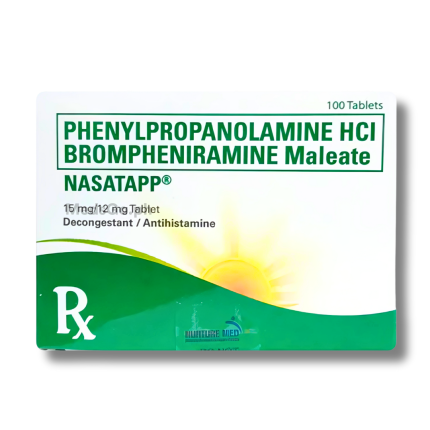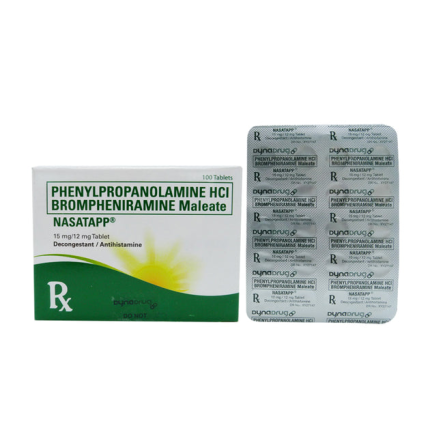All variations
Indications / Uses
NASATAPP Tablet is used for symptomatic relief of nasal congestion and upper respiratory allergies. It helps reduce runny nose, sneezing, and sinus pressure associated with common colds and allergic rhinitis. The formulation also alleviates itchy eyes and nasal passages caused by seasonal allergens.
Formulation / Ingredients
NASATAPP Tablet contains: Phenylpropanolamine Hydrochloride 15mg + Brompheniramine Maleate 12mg.
Do I need prescription to buy NASATAPP Tablet?
Yes, you need a prescription. But if you don't have one, you can get a free teleconsultation from MedsGo Physician. Just make an order and our Physician will call you back.
Side Effects
NASATAPP Tablet common side effects include: drowsiness, dry mouth, dizziness, and urinary retention. Less frequently, it may cause increased heart rate, nervousness, or gastrointestinal discomfort. High doses may lead to blood pressure elevation in sensitive individuals.
Directions and Dosage
- Adults (18+ years): 1 tablet every 4-6 hours as needed. Maximum: 4 tablets (60mg Phenylpropanolamine / 48mg Brompheniramine) in 24 hours.
- Adolescents (12-17 years): ½ tablet every 6-8 hours. Maximum: 3 tablets in 24 hours.
Not recommended for children under 12. Maximum continuous use: 7 days unless otherwise directed.
Contraindications
Avoid with severe hypertension, coronary artery disease, or monoamine oxidase inhibitor use. Contraindicated in narrow-angle glaucoma, urinary retention, or during acute asthma attacks. Not recommended for hyperthyroidism or prostate enlargement.
Use in Pregnancy and Lactation
Generally not recommended during pregnancy. Both components may pass into breast milk - avoid during lactation.
Special Precautions
- Avoid alcohol and CNS depressants due to additive sedation effects
- Use cautiously in patients with mild hypertension or diabetes
- May impair reaction speed - avoid driving or operating machinery
Is it safe to take it with other medications?
May interact with MAO inhibitors causing severe hypertension. Enhances sedation when taken with alcohol, sleeping pills, or tranquilizers. Consult before combining with blood pressure medications.
How should I store it?
Store below 30°C in a dry place. Keep the container tightly closed and protect from light. Keep out of reach of children.
Used For
Nasal Congestion
Age
Adults, Adolescents
Features
- Brompheniramine Maleate
- Phenylpropanolamine
Reviews
No reviews found
Pharmacist answers to questions about NASATAPP 1 Tablet









